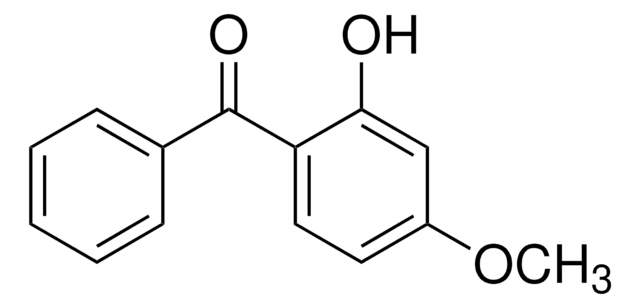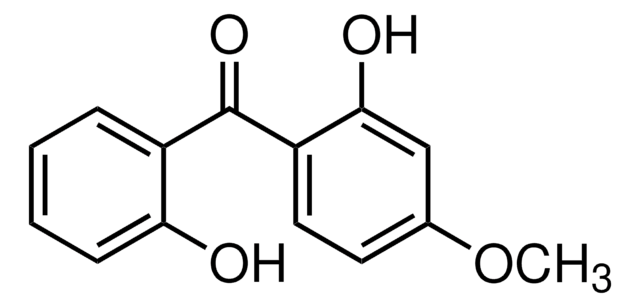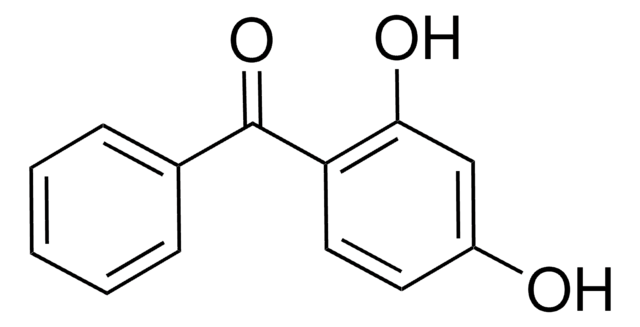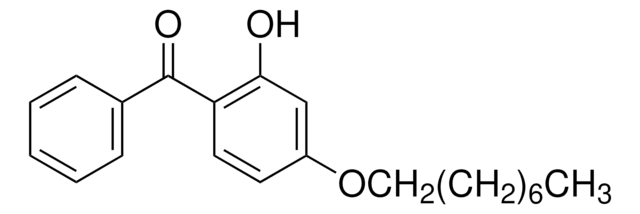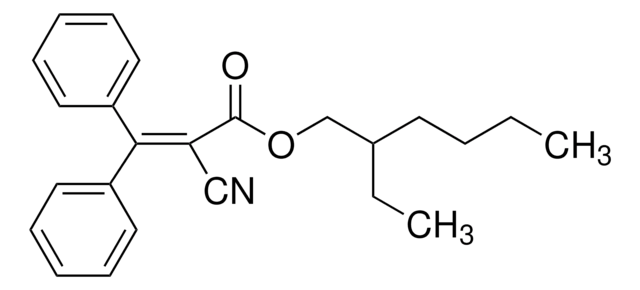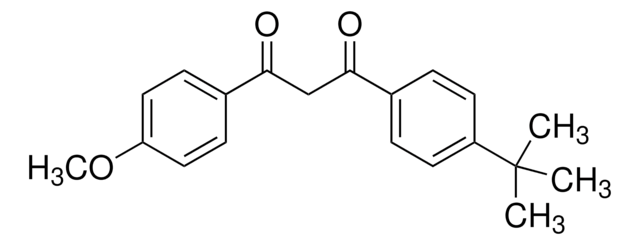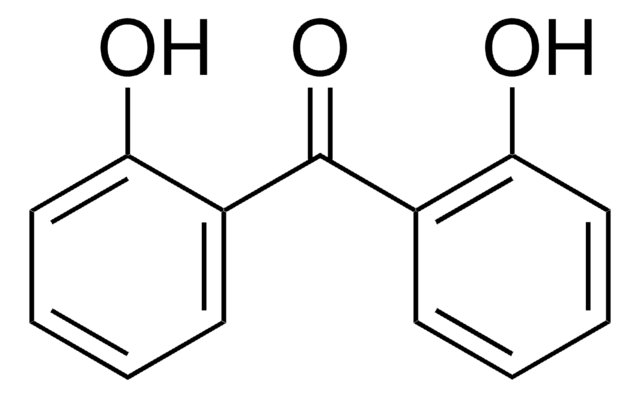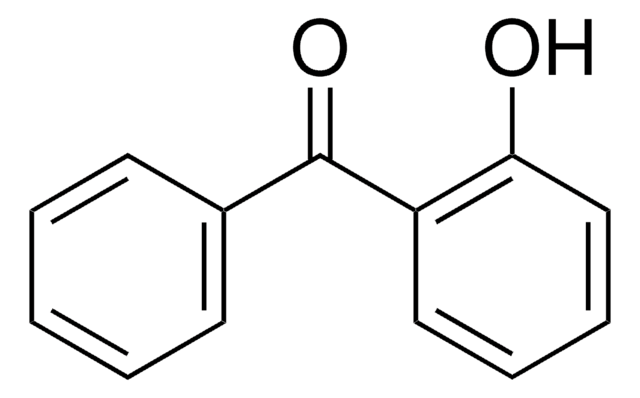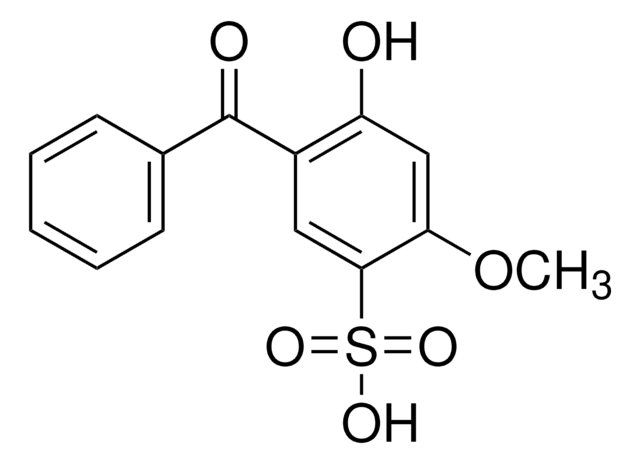T16403
2,2′,4,4′-Tetrahydroxybenzophenone
97%
Faça loginpara ver os preços organizacionais e de contrato
About This Item
Fórmula linear:
[(HO)2C6H3]2CO
Número CAS:
Peso molecular:
246.22
Número CE:
Número MDL:
Código UNSPSC:
12352100
ID de substância PubChem:
NACRES:
NA.22
Produtos recomendados
Nível de qualidade
Ensaio
97%
pf
198-200 °C (lit.)
cadeia de caracteres SMILES
Oc1ccc(c(O)c1)C(=O)c2ccc(O)cc2O
InChI
1S/C13H10O5/c14-7-1-3-9(11(16)5-7)13(18)10-4-2-8(15)6-12(10)17/h1-6,14-17H
chave InChI
WXNRYSGJLQFHBR-UHFFFAOYSA-N
Procurando produtos similares? Visita Guia de comparação de produtos
Categorias relacionadas
Aplicação
- Urinary concentrations of bisphenol A, parabens and benzophenone-type ultra violet light filters in relation to sperm DNA fragmentation in young men: A chemical mixtures approach.: This study investigates the relationship between urinary concentrations of various chemicals, including benzophenone-type UV filters like 2,2′,4,4′-Tetrahydroxybenzophenone, and sperm DNA fragmentation. The findings highlight potential reproductive toxicity risks associated with exposure to these compounds (Kiwitt-Cárdenas et al., 2024).
- Salting-out assisted liquid-liquid extraction combined with LC-MS/MS for the simultaneous determination of seven organic UV filters in environmental water samples: method development and application.: This paper discusses the development of a method for detecting organic UV filters, including 2,2′,4,4′-Tetrahydroxybenzophenone, in environmental water samples. The method offers a reliable way to monitor the presence of these compounds in the environment (Carve et al., 2023).
- Novel visible-light-active P-g-CN-based α-Bi(2)O(3)/WO(3) ternary photocatalysts with a dual Z-scheme heterostructure for the efficient decomposition of refractory ultraviolet filters and environmental hormones: Benzophenones.: The study presents a new photocatalyst capable of degrading benzophenone-type UV filters, including 2,2′,4,4′-Tetrahydroxybenzophenone, under visible light. This development has significant implications for environmental cleanup technologies (Berekute et al., 2023).
- Boosting elimination of sunscreen, Tetrahydroxybenzophenone (BP-2), from water using monopersulfate activated by thorny NanoBox of Co@C prepared via the engineered etching strategy: A comparative and mechanistic investigation.: This research explores a novel method for removing 2,2′,4,4′-Tetrahydroxybenzophenone from water using advanced nanotechnology, highlighting its effectiveness and potential for environmental applications (Khiem et al., 2023).
- The binding mechanism of benzophenone-type UV filters and human serum albumin: The role of site, number, and type of functional group substitutions.: The study examines how benzophenone-type UV filters, including 2,2′,4,4′-Tetrahydroxybenzophenone, interact with human serum albumin, providing insights into their behavior in biological systems and potential health implications (Ma et al., 2023).
Palavra indicadora
Warning
Frases de perigo
Declarações de precaução
Classificações de perigo
Acute Tox. 4 Oral - Eye Irrit. 2 - Skin Sens. 1A
Código de classe de armazenamento
11 - Combustible Solids
Classe de risco de água (WGK)
WGK 3
Ponto de fulgor (°F)
Not applicable
Ponto de fulgor (°C)
Not applicable
Equipamento de proteção individual
dust mask type N95 (US), Eyeshields, Gloves
Escolha uma das versões mais recentes:
Já possui este produto?
Encontre a documentação dos produtos que você adquiriu recentemente na biblioteca de documentos.
Os clientes também visualizaram
Christiane Schlecht et al.
Toxicology, 205(1-2), 123-130 (2004-10-02)
The estrogen receptors (ERs) are members of a super family of ligand-activated transcription factors mediating estrogenic responses. A close functional kinship was found for the structurally related estrogen receptor-related receptor1 (ERR1), a constitutively active transcription factor. The aryl hydrocarbon receptor
Dana Seidlová-Wuttke et al.
Toxicology, 213(1-2), 13-24 (2005-06-14)
The endocrine active substances BPA, DBP and BP2 have estrogenic effects in the uterus. Proc and Lin were shown to be antiandrogenic. Whether other estrogen-regulated parameters like lipids, fat metabolism and hormones are also affected by these substances is unknown.
Christiane Schlecht et al.
Archives of toxicology, 80(10), 656-661 (2006-04-06)
The tetrahydroxylated biphenyl-ketone 2,2',4,4'-tetrahydroxybenzophenone (BP2), one of twelve benzophenone-derived UV-filters, is used in cosmetic products and in packaging materials to protect these products from light induced damage. Recently published studies showed that BP2 exerts estrogenic activity; thus, it is an
Tatyana Shaw et al.
Dermatitis : contact, atopic, occupational, drug, 21(4), 185-198 (2010-07-22)
Rising use of sunscreen products has led to increased reporting of adverse reactions to sunscreens. To investigate possible photoallergic reactions in patients who identified themselves as "being allergic" to sunscreens. Patients filled out questionnaires about types of sunscreens they used
Christiane Schlecht et al.
Toxicology, 245(1-2), 11-17 (2008-02-05)
Twelve derivatives of benzophenone (BP1-BP12) are widely used as UV-screens to protect industrial products from light induced damage. There is growing public concern about industrially produced chemicals that might interfere with hormonal signalling pathways, thus having potential adverse effects on
Nossa equipe de cientistas tem experiência em todas as áreas de pesquisa, incluindo Life Sciences, ciência de materiais, síntese química, cromatografia, química analítica e muitas outras.
Entre em contato com a assistência técnica